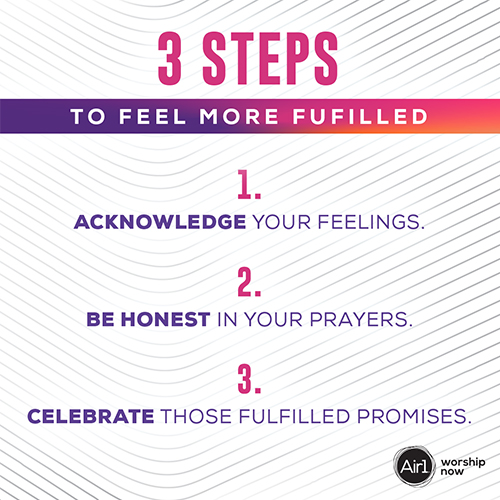
“Dad, can we go there soon?”
My son asked this question from the backseat of our car as we drove past a park that we’d watched construction on for many months. The park was finally open and he saw kids his age playing on slides, climbing through tunnels, and bouncing around the splash pad.
“Sure, buddy. We’ll go there one day soon.”
Ever since I made that promise to my son, he has reminded me of it. When we drive past the park on the way to another family commitment, he struggles to comprehend why we cannot turn into the park and play. Recently, I realized he was beginning to doubt the promise.
In the room next to me, my kids are watching a movie counting down the hours until we head to that park for the first time later today.
As my son struggled to believe in a promise made that didn’t seem to be fulfilled on his timeline, or in the way he expected, I began to reflect, thinking “I know the feeling.” The promises I struggle to believe aren’t related to a park visit, but to the movement of God.
There is often a gap between seeing God make a promise and seeing the promise fulfilled. In that gap, struggle occurs. We struggle to believe God is working when we can’t see progress, and we struggle to remain faithful when God’s timeline doesn't match ours.
The people of God in the Bible must have felt the same way. In Isaiah 61, the prophet tells the people of the promise of freedom. “The Spirit of the Sovereign Lord is upon me, for the Lord has anointed me to bring good news to the poor. He has sent me to comfort the brokenhearted and to proclaim that captives will be released and prisoners will be freed. He has sent me to tell those who mourn that the time of the Lord’s favor has come, and with it, the day of God’s anger against their enemies.”
Those words contain an incredible message of hope - a promise of freedom. However, they were written at a time when the people were suffering under evil kings and headed towards defeat by foreign oppressors. In fact, there was a roughly 700 year gap between Isaiah speaking those prophetic words and the arrival of the Messiah, Jesus.
In Luke 4, Jesus enters a synagogue in Nazareth, the town where he grew up. He opens the scroll of Isaiah to chapter 61 and reads those words. Luke records what happened next.
“He rolled up the scroll, handed it back to the attendant, and sat down. All eyes in the synagogue looked at him intently. Then he began to speak to them. ‘The Scripture you’ve just heard has been fulfilled this very day!’”
Those in the audience that day struggled to accept the fulfillment of the promise. They rejected Jesus as the fulfillment of Isaiah’s words, going so far as to attempt to throw Jesus off a cliff in order to kill them.
Now, I strongly doubt that your struggle with the gap between God making promises and God fulfilling promises has led you to attempted murder. But, I wouldn’t be surprised if you struggled like the people in Luke 4 did.
Throughout the Scriptures, God promises freedom. In addition to the words Jesus reads from Isaiah 61, there are the powerful words we read in the beginning of Romans 8. “So now there is no condemnation for those who belong to Christ Jesus. And because you belong to him, the power of the life-giving Spirit has freed you from the power of sin that leads to death.”
The Apostle Paul said we have been freed from the power of sin that leads to death. Yet sometimes, we feel powerless to overcome a sinful habit, a destructive mindset, or an ongoing struggle that is destroying what we care about most. We read about God promising freedom, but we don’t experience that freedom.
If that’s your experience, you’re far from alone! Also, you are not without a way forward. In fact, I believe there are three important steps for you to take.
1. Acknowledge your feelings as real, but not final. So many of our decisions are built on feelings. We enthrone our emotions as ultimate definers of facts. However, our emotions often evolve and change in a matter of days, weeks, or months. Feelings deserve acknowledgement, but they should be allowed to be what they are - evolving and changing.
2. Become even more honest in your prayers with God. Over the last 18 months, the Psalms have become a place of respite for me. My intense emotions and personal struggles needed a place where they could be unloaded and explored. When I read some of the psalms, I find those folks are more honest than I’m comfortable being with God. Those words are a good reminder I can be more honest than I’ve been.
3. Choose to celebrate the places where you have experienced fulfilled promises. You may have places in your life where God’s promises don’t seem to have been fulfilled or you haven’t personally experienced the fulfillment. Yet, there are places where God’s promises have been fulfilled and you have seen undeniable evidence that God is a promise-maker and a promise-keeper. Since both are true, we get to choose where we will focus. We can intentionally choose to celebrate the places where God has done exactly what He promised.

That’s why we can sing along with Chris McClarney in his song, "Speak to the Mountains,"
“I won’t be moved
My God is faithful
His promise is true.”
RELATED CONTENT: "Speak to the Mountains" by Chris McClarney
God has promised freedom to us. We can allow our feelings and frustration to move us away from faith, or we can be unmoved in faith and trust in Him.
Scott Savage is a pastor and a writer with the coolest last name ever. He leads Cornerstone Church in Prescott, Arizona. Scott is married to Dani and they are the parents of three “little savages.” He helps hurting people forgive others through his Free to Forgive course and you can read more of his writing at scottsavagelive.com





